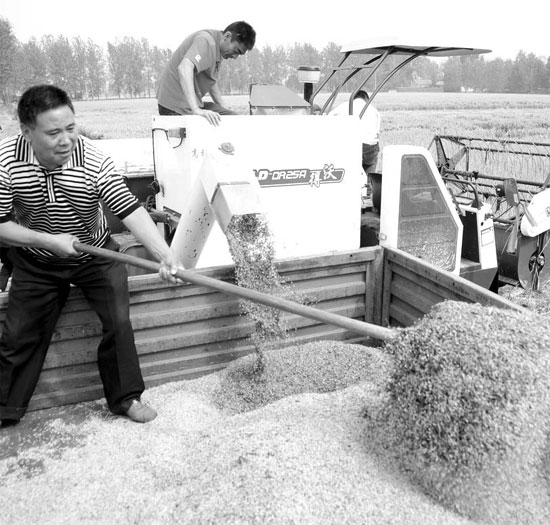Nation aims to cultivate growth of family farms
Updated: 2013-10-08 07:31
By Zhong Nan (China Daily)
|
||||||||
China will promote the development of family farms to facilitate specialized, intensive and large-scale agricultural operations by eliminating the shortcomings caused by traditional small-scale farming and urbanization, said a government official.
Sun Zhonghua, director-general of the department of rural economic systems and management of the Ministry of Agriculture, said that along with a sustained and massive migration of young and middle-aged farmers, rural areas have seen their labor force grow older, more female and less educated.
Attracted by China's trade and manufacturing boom in the past two decades, many farmers from inland provinces or traditional agricultural regions such as Sichuan and Hunan pursued higher pay in the factory towns of coastal provinces such as Guangdong, Zhejiang and Jiangsu.
A study by the Beijing-based China Agricultural University undertaken in Hubei and Hunan provinces found the average age of farmers in these provinces is 53, and young people in rural areas are shunning farm life.
|
Farmers reap rice in Linyi, Shandong province, on Monday. After years of reform and improvement in rural areas, China has established a system for agricultural operations. Fang Dehua / For China Daily |
As the average age for a farmer rises, getting young people back on the land has become an urgent issue in rural areas, which cannot compete with the wages and living standards of cities.
The sector's major problems include rising production costs, worsening structural mismatches in the supply and demand of agricultural products and rapid social changes in rural areas, according to China's Report on the Work of the Government of 2013 released earlier this year.
After years of reform and improvement in rural areas, the nation has established a system for agricultural operations, where family farming lays a foundation and multiple production entities co-exist.
There are 226 million farming households, including 2.76 million major grain growers (defined as those with more than 3.3 hectares of land), 600,000 registered farmer cooperatives, 110,000 large agro-industry enterprises, emerging family farms and a variety of social service organization for agriculture.
Nevertheless, the existing system for agricultural operations isn't sufficiently specialized, well organized or commercialized.
To tackle these issues, the government formulated a comprehensive range of policies this year to accelerate rural land transfers and grant higher subsidies to large-scale landholders, family farms and rural cooperatives, to encourage the establishment of bigger, specialized farming units.
Sun said a registration system for family farms will be established in areas where conditions allow.
The criteria and methods for registration for family farms need to be clarified, and new agricultural subsidiaries need to be tilted in favor of family farms.
"To further ensure the country's food security, awards will also be conferred on family farms that have reached a certain scale and contracted land needs to be transferred to family farms," Sun said.
"More guidelines are being discussed and drafted to allow family farms to enhance their managerial capability and market competence within this year.
"Professional farm training will also be provided for family farm owners, major grain growers and breeders, and high-quality talent will be encouraged to venture into farming," Sun said.
Similar to the period when China introduced the household contract responsibility system in rural areas in the early 1980s, the family farm model could develop and reshape China's agricultural sector.
Li Changping, president of the Beijing-based China New Rural Planning and Design Institute, said that given favorable market conditions, the main restriction on a farmer's income depends on the scale of agricultural production, which indicates that family farms with sufficient labor and resources will be able to meet the production goals and make a profit.
"Therefore, increasing the number of family farms would put more people into farm work and could steadily improve living conditions for rural inhabitants.
"However, the key point in tackling the problem of farm labor shortages remains how to raise farmers' incomes," Li said.
"Once people discover that working on family farms could bring a higher financial return than working in a factory, it will become a really popular choice."
zhongnan@chinadaily.com.cn
(China Daily 10/08/2013 page14)

 Firming friendships
Firming friendships
 A smog-filled Beijing targets polluting cars
A smog-filled Beijing targets polluting cars
 Animal welfare to be added in training
Animal welfare to be added in training Chasing the dragons
Chasing the dragons
 Boehner: US on path to default if Obama won't negotiate
Boehner: US on path to default if Obama won't negotiate
 New couples take wedding photos during holiday
New couples take wedding photos during holiday
 Williams beats Jankovic to win second China Open title
Williams beats Jankovic to win second China Open title
 Red alerts as Fitow closes in
Red alerts as Fitow closes in
Most Viewed
Editor's Picks

|

|

|

|

|

|
Today's Top News
WB cuts growth forecast for China, East Asia
Kerry hails weapons destruction
Robust home sales during holiday
China calls on the United States to stay solvent
Beijing targets polluting cars
APEC 'should take lead' in FTA talks
US, Japan warned over sea issues
Academics evaluate China at conference
US Weekly

|

|







